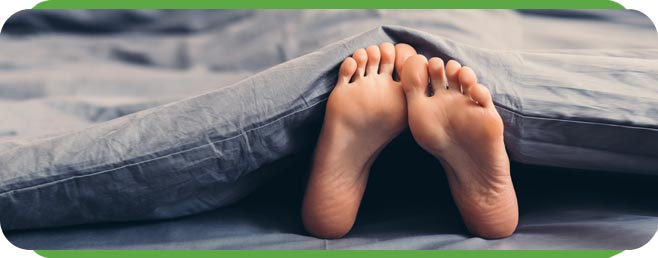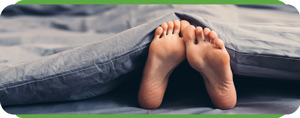Restless Legs Syndrome Treatment Questions and Answers
If your restless legs are disturbing you at night and affecting your quality sleep, talk to our team of healthcare providers today at Koala® Center For Sleep & TMJ Disorders. For more information call us at one of our clinics or request an appointment online. We serve patients from all over the USA. Locations in Bloomington IL, Peoria – Dunlap IL, El Paso TX, Wausau WI.




Table of Contents:
How does restless legs syndrome affect sleep?
What causes restless legs syndrome?
How is restless legs syndrome diagnosed?
What is the treatment for Restless legs syndrome?
When relaxed in bed and almost drifting off to sleep, suddenly we get the urge to compulsively move our legs. Almost all of us have experienced this before, and for most of us, it is a fleeting feeling that is only experienced a few times throughout our entire lives. However, for others, it can be persistent, happening several times a night. Known as restless legs syndrome or RLS, this sleep disorder can interfere with the quality of life and make it hard to get a good night’s rest.
Restless legs syndrome can have a negative impact on the quality of sleep because the condition occurs when resting and can make it difficult to fall asleep. Concerns about sleep are one of the main reasons people seek medical care for restless legs syndrome. As many as 10 percent of American adults may be experiencing restless legs syndrome, and the condition is more common in women than it is in men. The risk of restless legs syndrome also increases with age and is much more prominent in middle-aged and older populations. Moderate to severe RLS symptoms are typically bothersome enough to require treatment, with the majority of these cases caused by another disorder. This is known as secondary RLS. When the underlying disorder is treated, symptoms of RLS will usually resolve or significantly improve. In the vast majority of cases of RLS, people also report at least one additional sleep disorder, such as insomnia, periodic limb movement disorder, or obstructive sleep apnea (OSA).
There are many different causes of restless legs syndrome (RLS), although in some cases, it may not be evident. Sometimes RLS is associated with other medical conditions, such as multiple sclerosis (MS) late-stage kidney disease, neuropathy, iron deficiency, or Parkinson’s disease. RLS can also occur during pregnancy, with around a fifth of women developing RLS sometime during the third trimester. The symptoms of RLS typically decline after giving birth. Although the cause is evident in some cases, there are other cases where the cause is unknown. RLS may also have a genetic component. The main triggers for RLS include sitting or resting, although other factors can make symptoms worse. These include:
– Alcohol consumption
– Caffeine intake
– Nicotine use
– Sleep deprivation
– Stress
– A sedentary lifestyle
– Obesity
– Pregnancy
– Diabetes
– Sleep-disordered breathing
– Peripheral neuropathy
– Renal insufficiency
– Medication such as antihistamines and certain antidepressants
To diagnose restless legs syndrome, doctors will first review the patient’s medical history and ask for a description of their symptoms. Diagnoses are based on the following criteria:
– A strong urge to move legs
– Symptoms start or get worse when resting
– Symptoms are partially/temporarily relieved by activity
– Symptoms are worse at night
– Symptoms cannot be explained by another condition
Following this, a doctor may conduct a physical and/or a neurological exam.
The treatment for restless legs syndrome ranges from at-home remedies to medical devices. At-home treatments may include:
– Moving the legs
– Implementing healthy sleep hygiene habits
– Avoiding tobacco and eating a healthy diet
– Exercising
– Receiving massages or self-massaging
– Using heat or cold
Medical treatments may include:
– Compression foot wrap
– Vibrating pad
If you are experiencing restless legs syndrome, come to Koala® Center For Sleep & TMJ Disorders for diagnosis and treatment. To provide care for as many people as possible, Koala® Center For Sleep & TMJ Disorders has convenient locations near you in Bloomington, IL; Peoria – Dunlop, IL; Columbia, MO; Wausau, WI; and El Paso, TX. To find out which Koala® Center For Sleep & TMJ Disorders is closest to you, visit our Locations page! We look forward to serving you!

Additional Services You May Need
▸ KoalaKIDZzz®
▸ Sleep Apnea
▸ Snoring
▸ TMJ Disorder
▸ Fatigue
▸ Sleep Disorders
▸ Weight Loss
▸ CPAP Alternative
▸ Oral Appliances




